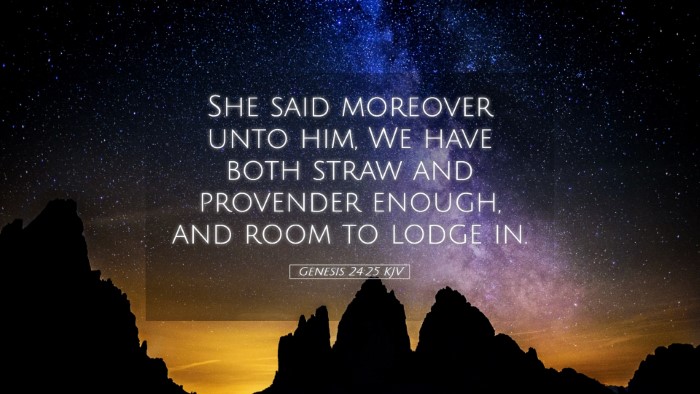Commentary on Genesis 24:25
Genesis 24:25 states: "And she said unto him, We have both straw and provender enough, and room to lodge in."
This verse comes during the account of Abraham's servant who is seeking a bride for Isaac. The servant's journey, prompted by Abraham’s desire to find a wife for his son among his own kin, emphasizes not only the importance of family lineage but also the practice of providential guidance in the biblical narrative.
Insights from Matthew Henry
Matthew Henry, in his commentary, notes the graceful manner in which Rebekah responds to the servant’s request for hospitality. Her words reflect a generous spirit and readiness to serve, emblematic of the godly character that one would expect in a future matriarch of the covenant people.
-
Generosity: Henry underscores that Rebekah’s response encompasses the biblical attitude of hospitality, which is foundational in ancient Near Eastern culture. Her offering of both straw and provender represents not only physical provisions but suggests a welcoming heart willing to aid the stranger.
-
Symbolism of Abundance: The mention of “straw and provender” holds profound significance as they were essential for both the animals and the people traveling great distances, thus showing Rebekah’s foresight and understanding of the servant’s needs.
-
Preparedness: Henry points out that God had evidently guided Rebekah to be prepared for this encounter, demonstrating that her character and generous spirit were part of God’s plan in the unfolding narrative of His covenant with Abraham and his descendants.
Insights from Albert Barnes
Albert Barnes emphasizes the thematic significance of the servant’s journey and how it reflects the providential care of God in fulfilling His promises.
-
Divine Guidance: Barnes elucidates that the servant's undertaking is not merely a transactional mission but a divinely ordained path leading to the fulfillment of God's promises to Abraham, as seen in the enlightening response of Rebekah.
-
Rebekah as a Type: Barnes also sees Rebekah as a type of the Church, chosen and prepared by God to fulfill His covenant purposes. Her immediate hospitality and abundant provisions mirror the gracious nature of God's dealings with His people.
-
Covenantal Significance: He further points out that this interaction is steeped with the covenantal significance of ensuring that Abraham’s lineage remains pure and part of the divine plan.
Insights from Adam Clarke
Adam Clarke provides additional depth by exploring the cultural context surrounding hospitality in the ancient world.
-
Cultural Context: Clarke emphasizes that offering shelter and food was a sacred duty, fostering a sense of community and familial bond. Rebekah invites the servant into her household, signifying an open heart and adherence to customs that valued kindness to strangers.
-
Character Study: He highlights the character of Rebekah as exemplary, illustrating her virtuous nature and readiness to engage in a covenant relationship, which is essential for the continuation of God's plan through Isaac.
-
Prophetic Role: Clarke argues that Rebekah’s response not only fulfills the servant’s immediate need but prophetically points to her greater role in the lineage through which the Messiah would eventually come.
Theological Implications
Genesis 24:25 prompts significant theological reflections for contemporary readers. The emphasis on hospitality can lead to a broader understanding of how the faithful are called to respond to strangers and those in need.
-
Hospitality as a Virtue: The verse illustrates the biblical virtue of hospitality, pushing pastors and scholars to consider how this trait is foundational to Christian living and community building.
-
God’s Providence: The narrative reaffirms God’s providential hand in shaping lives and destinies, a theme critical for understanding the overarching storyline of the Scripture.
-
Covenant Relationships: Rebekah’s willingness to provide for the servant signifies the depth of covenant relationships, amplifying the importance of faithful companionship in fulfilling divine purposes.
Practical Applications
For pastors and theologians, the insights drawn from Genesis 24:25 encourage practical applications in ministry.
-
Emphasizing Hospitality: Churches should encourage hospitality as a scriptural mandate, fostering environments where believers and newcomers are welcomed and served.
-
Highlighting Preparedness: Like Rebekah, individuals should be spiritually and practically prepared to meet the needs of others, reflecting a life aligned with God’s purpose.
-
Teaching on Divine Guidance: The passage can be used to teach about the importance of seeking God's guidance in major life decisions, echoing the servant's faithful quest for direction.
In summary, Genesis 24:25 provides a rich tapestry of insights that resonate throughout biblical history and inform contemporary Christian life. The character of Rebekah serves as an enduring model of virtue, service, and readiness to fulfill God’s calling in her life.


